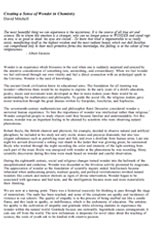
Auteur : Mitchell David
Ouvrage : Creating a sense of wonder in chemistry
Année : *
Lien de téléchargement : Mitchell_David_-_Creating_a_sense_of_wonder_in_chemistry.zip
The most beautiful thing we can experience is the mysterious. It is the source of all true art and science. He to whom this emotion is a stranger, who can no longer pause to WONDER and stand rapt in awe, is as good as dead : his eyes are closed... To know that what is impenetrable to us really exists, manifesting itself as the highest wisdom and the most radiant beauty which our dull faculties can comprehend only in their most primitive forms-this knowledge, this feeling, is at the center of true religiousness. - Albert Einstein. Wonder is an experience which blossoms in the soul when one is suddenly surprised and amazed by the attentive consideration of something rare, astonishing, and extraordinary. When we feel wonder we feel enlivened through our own vitality and feel a direct connection with an archetypal spark in the Universe. Wonder is the seed of knowledge. The ancient Greek civilization knew its educational aims. The foundation for all learning was wonder otherwise there would be no impulse to explore. In the early years of a child's education, poetry, music and movement were developed so that in more mature years there would be an understanding for mathematics and philosophy. To guide the social life, the religious leaders gave moral instruction through the great dramas written by Euripides, Aeschylus, and Sophocles. The seventeenth-century mathematician and philosopher René Descartes considered wonder a universal human experience. To him the importance of wonder was intellectual rather than religious.1 Wonder compelled people to study objects until they became familiar and understandable. For this reason, wonder was an important feeling to be attained by scientists who were observing natural phenomena. Robert Boyle, the British chemist and physicist, for example, decided to observe natural and artificial phosphors; he included in his study not only exotic stones and precious diamonds, but also less elegant substances such as putrefying meat and fish, and even a distillate from human urine. Late one night his servant discovered a rotting veal shank in the larder that was glowing green; he summoned Boyle who worked through the night recording the color and intensity of the light emitting from each part of the meat. Boyle was energized with wonder at the phenomena he was recording. Many scientific discoveries during this time were made based on wonder and careful observation. During the eighteenth century, social and religious changes turned wonder into the hallmark of the unsophisticated and credulous. Wonder was discarded as the frivolous activity promoted by magicians. The appreciation of wonder as the foundation of scientific inquiry ended. Intellectuals became infuriated when undiscerning priests, medical quacks, and political revolutionaries invoked natural wonders like comets and meteor showers as signs of divine intervention. Wonder began to be associated with ignorance and bad taste, and the intelligentsia became more and more materialistic their thinking. We are now at a turning point. There was a historical necessity for thinking to pass through the stage of materialism. The nadir has been reached, and some of the symptoms are apathy and incidences of violence in our schools. The quality of empathy is in the process of being snuffed out like a candle flame, and this leads to apathy, or indifference, which is the archenemy of education. The antidote for apathy is the cultivation of empathy and gratitude while allowing students to experience the wonder within the natural world. Gratitude focuses one outwardly. Ingratitude causes estrangement; it cuts one off from the world. The new millennium is desperate for novel ideas about the teaching of science; the souls of youth ask to be kindled with creative passion. ...

Demolins Edmond - L'éducation nouvelle
Auteur : Demolins Edmond Ouvrage : L'éducation nouvelle Année : 1898 Lien de téléchargement :...














